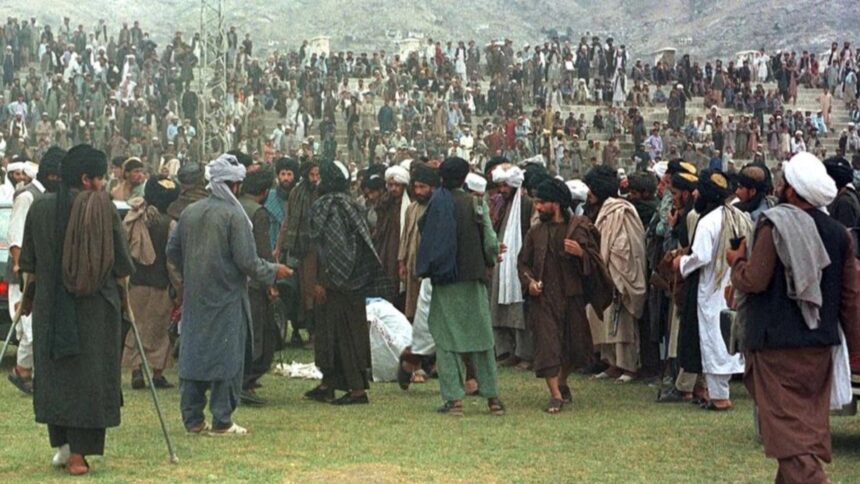RASC News Agency: In yet another grim display of Taliban brutality disguised as justice, the group’s so-called Supreme Court has announced that five women and thirteen men were publicly flogged in Gosfandi district of Sar-e-Pul province. The incident, which took place on Wednesday, July 16, was reportedly carried out following what the Taliban claim was a “legal proceeding” for crimes ranging from gambling and extramarital relations to murder and “illicit phone contact.” According to a statement from the Taliban’s judiciary, the individuals were each sentenced to 20 to 35 lashes and prison terms ranging from six months to two years. The executions of the sentences were approved by the Taliban’s Chief Justice a figure appointed not through public mandate but through the opaque and unaccountable structure of Taliban rule.
Since their forceful return to power in August 2021, the Taliban have repeatedly resorted to medieval-style corporal punishments, often carried out in public squares to instill fear and reinforce their draconian version of Islamic law. These public floggings and executions, often administered without due process or legal representation, have drawn widespread condemnation from international human rights bodies, including the United Nations and the European Union. These organizations have categorically denounced public corporal punishment including flogging and executions as flagrant violations of international human rights law and basic human dignity. Repeated calls for an immediate cessation of such inhumane practices have been consistently ignored by the Taliban, who remain entrenched in their rigid interpretation of Islamic jurisprudence, devoid of transparency or modern legal safeguards.
Despite mounting global pressure and increasing documentation of abuses, the Taliban continue to justify these acts under the pretext of enforcing Sharia law. However, legal experts and independent observers assert that the current Taliban-led justice system bears no resemblance to a legitimate judiciary. Defendants are routinely denied access to defense attorneys, trials are conducted in secrecy, and the right to appeal is virtually nonexistent. What is particularly disturbing in this latest case is the public whipping of five women a practice that sharply underscores the gendered violence institutionalized under Taliban rule. Analysts argue that women in today’s Afghanistan are enduring the brunt of structural violence, facing escalating restrictions, humiliation, and punitive measures that strip them of even the most basic human rights.
Under Taliban rule, where previous civil and legal institutions have been dismantled, ordinary Afghanistanis especially women are left without any meaningful recourse for justice. In such a regime, victims of these so-called legal punishments are deprived not only of due process, but also of any hope for protection or advocacy, whether from domestic institutions or international mechanisms. The Taliban’s persistence in these barbaric practices, despite near-universal condemnation, reflects their deliberate defiance of international norms and their desire to cement fear as a means of control. Their conception of “justice” is not a restoration of societal order, but rather a calculated campaign of repression particularly aimed at women, who have become the primary targets in this dystopian regime.
As Afghanistan descends deeper into a state of authoritarian religious rule, global human rights defenders warn that the country’s legal system is now entirely weaponized serving not the cause of justice, but the perpetuation of an extremist ideology that seeks to erase individual liberty, especially for Afghanistan’s women and vulnerable communities.






